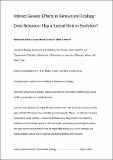Files in this item
Indirect genetic effects in behavioral ecology : does behavior play a special role in evolution?
Item metadata
| dc.contributor.author | Bailey, Nathan William | |
| dc.contributor.author | Marie-Orleach, Lucas | |
| dc.contributor.author | Moore, Allen | |
| dc.date.accessioned | 2018-12-13T00:37:39Z | |
| dc.date.available | 2018-12-13T00:37:39Z | |
| dc.date.issued | 2018-01-13 | |
| dc.identifier | 252043289 | |
| dc.identifier | 79126837-442e-44f1-9d2b-f3e177eee8d4 | |
| dc.identifier | 85040824280 | |
| dc.identifier | 000422957500004 | |
| dc.identifier.citation | Bailey , N W , Marie-Orleach , L & Moore , A 2018 , ' Indirect genetic effects in behavioral ecology : does behavior play a special role in evolution? ' , Behavioral Ecology , vol. 29 , no. 1 , pp. 1-11 . https://doi.org/10.1093/beheco/arx127 | en |
| dc.identifier.issn | 1045-2249 | |
| dc.identifier.uri | https://hdl.handle.net/10023/16679 | |
| dc.description | We gratefully acknowledge funding to NWB from the Natural Environment Research Council (NE/I027800/1), to LMO from the Swiss National Science Foundation (P2BSP3_158842), and to AJM from the National Science Foundation (IOS-1326900). | en |
| dc.description.abstract | Behavior is rapidly flexible and highly context-dependent, which poses obvious challenges to researchers attempting to dissect its causes. However, over a century of unresolved debate has also focused on whether the very flexibility and context-dependence of behavior lends it a unique role in the evolutionary origins and patterns of diversity in the Animal Kingdom. Here, we propose that both challenges can benefit from studying how indirect genetic effects (IGEs: the effects of genes expressed in one individual on traits in another individual) shape behavioral phenotypes. We provide a sketch of the theoretical framework that grounds IGEs in behavioral ecology research and focus on recent advances made from studies of IGEs in areas of behavioral ecology such as sexual selection, sexual conflict, social dominance, and parent–offspring interactions. There is mounting evidence that IGEs have important influences on behavioral phenotypes associated with these processes, such as sexual signals and preferences and behaviors which function to manipulate interacting partners. IGEs can also influence both responses to selection and selection itself, and considering IGEs refines evolutionary predictions and provides new perspectives on the origins of seemingly perplexing behavioral traits. A key unresolved question, but one that has dominated the behavioral sciences for over a century, is whether behavior is more likely than other types of traits to contribute to evolutionary change and diversification. We advocate taking advantage of an IGE approach to outline falsifiable hypotheses and a general methodology to rigorously test this frequently proposed, yet still contentious, special role of behavior in evolution. | |
| dc.format.extent | 1088679 | |
| dc.language.iso | eng | |
| dc.relation.ispartof | Behavioral Ecology | en |
| dc.subject | Behavioural plasticity | en |
| dc.subject | Interacting phenotype | en |
| dc.subject | Interaction coefficient psi | en |
| dc.subject | Sexual conflict | en |
| dc.subject | Sexual selection | en |
| dc.subject | Social behavior | en |
| dc.subject | QH301 Biology | en |
| dc.subject | QH426 Genetics | en |
| dc.subject.lcc | QH301 | en |
| dc.subject.lcc | QH426 | en |
| dc.title | Indirect genetic effects in behavioral ecology : does behavior play a special role in evolution? | en |
| dc.type | Journal item | en |
| dc.contributor.sponsor | NERC | en |
| dc.contributor.sponsor | NERC | en |
| dc.contributor.institution | University of St Andrews. School of Biology | en |
| dc.contributor.institution | University of St Andrews. Centre for Biological Diversity | en |
| dc.identifier.doi | 10.1093/beheco/arx127 | |
| dc.description.status | Peer reviewed | en |
| dc.date.embargoedUntil | 2018-12-13 | |
| dc.identifier.grantnumber | Ne/I027800/1 | en |
| dc.identifier.grantnumber | NE/L011255/1 | en |
This item appears in the following Collection(s)
Items in the St Andrews Research Repository are protected by copyright, with all rights reserved, unless otherwise indicated.

